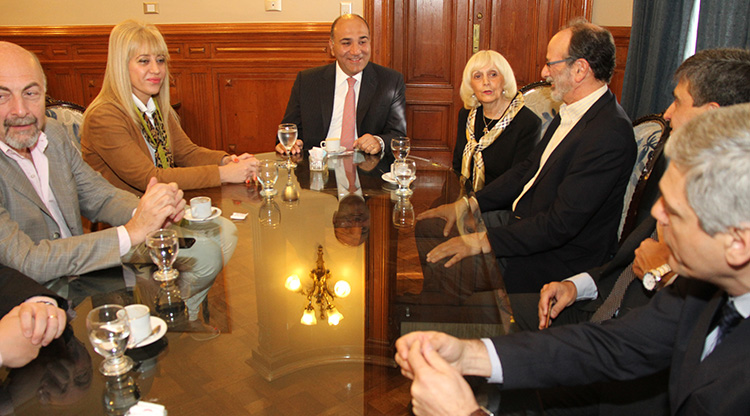, arranged a number of talks and meetings which I'll report on as I get organized. Some of the meetings were about the prospects of organizing kidney exchange in Argentina (where there has already been
). My first meeting on this subject was in Buenos Aires, my second in Tucuman. Both were promising.
Here are some reports from Tucuman.
Here's an account of my meeting with Governor Juan Manzur and the Minister of Public Health Rossana Chahla and their colleagues, on November 18.
***********
Here's a news story that combines an interview with me (the reporter asked first about Donald Trump and only then about kidneys), followed by some comments by the Minister of Public Health on the prospects for kidney exchange:
“Las barreras al comercio en Estados Unidos afectarán a países desarrollados y a emergentes”
from Google Translate:
"The health minister of the province, Rossana Chahla said that the Government was interested in the visit of the American expert for their expertise in increasing the number of transplants and ablations, and the possibility of replicating this model in Tucuman.
"from here we will coordinate with Argentine economists studying this issue and we want to have a specialist to see visit how to work in Chicago (United States) and bring solutions to the province benefit people , "he said.
on the other hand, the official said that the work of Roth have shown that interventions crossed kidney transplants allow the state to reduce costs in dialysis treatments and reduce waiting lists of patients.
" in the United States there is a law that allows cross and living donor transplants, which means that by a living donor, you can make a donation chain where several people benefit , "said Health Minister, as appropriated news agency Telam .
he added that in Argentina this can only be done with a court order and stressed that, therefore, only transplants are specified with cadaver donor, generating extensive waiting lists for access to organs.
"the US system reduces lists and Roth shows that these interventions reduces health costs, and helps solve the quality of life of people because not to do dialysis and can be reinserted fast occupationally "analyzed Chahla. "
**********
And here's a report of a subsequent meeting held by Dr Chahla:
Mejoras en materia de trasplantes (Improvements in transplant).
"Minister of Public Health, Dr. Rossana Chahla, met with the director of Cucaituc, Dr. Aldo Bunader to treat transplant referral service issues in the province. They were attended by Nobel Prize-winning economist Alvin Roth, who offered to work together in what refers to Software, donation and transplantation cross.
Bunader was satisfied with the points raised and by the visit of economist Roth. "We have been meeting with him. He offered all their service, make an agreement and exchange; We're very pleased with that part, "he said."














